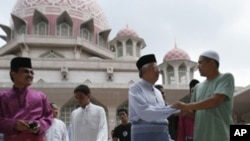Malaysia's Human Rights Commission says it will look into reports that 200 Shi'ite Muslims were detained earlier this month. Shia Islam is banned in the country.
The commission declined VOA's request for an interview about the recent detention of 200 Shi'ites. But its chairman says it is looking into the matter.
The investigation comes in response to a petition from the Shi'ite community says political analyst Johan Saravanamuttu, with the Institute of Southeast Asian Studies in Singapore.
"The Shias themselves, who are by the way, are mostly Malaysians, have protested to the Human Rights Commission of Malaysia, which is an authority that is set up by the government. It only has an advisory role. They have taken the case. Some 30 of them went to see one of the commissioners, and the commission has agreed to take up the case with the government," Saravanamuttu says.
Malaysia's government considers the Shia denomination illegal. It allows only Sunni Islam to be practiced by Muslims, who make up nearly two-thirds of the Southeast Asian country's population.
Although other approved religions, including Christian denominations, Hinduism and Buddhism are allowed in Malaysia, the government considers Shi'ite Islam a deviant sect of Islam. Saravanamuttu says the Department of Islamic Development in Malaysia has cracked down on Shi'ite and other non-Sunni Islamic sects in the past and is empowered by law to do so.
"Islam is the state religion or, rather, Islam is the religion of the federation, so it does have a privileged position in the Malaysia political context and is recognized in the constitution as such," he says.
Malaysian media have speculated that the arrests may have been part of an anti-terror operation against militant Muslim groups. But Saravanamuttu does not give this theory much weight because religious authorities, and not the police, were involved.
He says this most recent crackdown may have been triggered by public acts of worship by Shi'ites. Religious friction in Malaysia has been on the rise. Earlier in the year, a legal dispute over whether non-Muslims could use the word "Allah" sparked attacks on churches and a Sikh temple.
While the government strives to promote Malaysia as a moderate Muslim nation, Saravanamuttu says conservative religious authorities are trying to enforce a strict interpretation of Islam, and their power is growing.
Malaysia to Probe Crackdown on Shia Muslims




